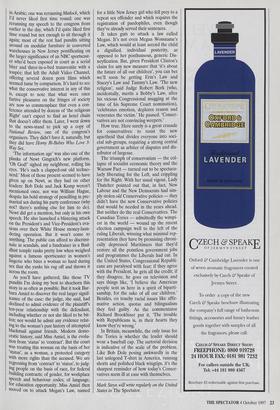WITH NEWT AND THE LADY
Mark Steyn at
an international meeting of history's defeated winners
Washington, DC I'VE NEVER much cared for the phrase 'Lady Thatcher': to my mind, she should have either held out for the full-blown earldom or remained a glorious Mrs. But in America at least, the new moniker comes in to its own. CNN's Larry King always introduces her as 'Margaret "The Lady" Thatcher', which formulation gives her the menacing air of a mobster, like Sammy 'The Bull' Gravano. Conservative politics isn't organised crime, of course; indeed, these days it isn't organised at all. But in America, Margaret The Lady is one of the few things this fractious coalition can agree on.
'When I think of the word "freedom": droned the House majority leader Dick Armey, sounding like a bad high-school valedictorian, 'what comes to mind? The Liberty Bell, President Reagan's speech at the Berlin Wall. . . and Lady Thatcher.' On a rainy Sunday afternoon, the Lady had returned to Congress for the unveiling of a portrait of the good old days — Ronald Reagan and Margaret Thatcher together in the early Eighties. She stared at the painting wistfully. 'It's quite something to me,' she mused, 'to be alive and still be history.' Lady Thatcher was in Washington, as I was, for the First International Conserva- tive Congress — a gathering convened, in essence, to answer the question: why are we such a bunch of losers? Post-Thatcher Conservatives are barely alive at all, and they're history mainly in the robust and useful American sense of the word. Bob Dole? Aw, he's history. John Major, Kim Campbell, Alain Juppe? They're history. Fuhgeddaboutem.
Imagine if you were Attila the Hun and, after years as the world's pre-eminent right-wing bastard, you suddenly found yourself outflanked by an elusive newcom- er called Attila the Honey-Bun: he's got the same right-wing policies on raping, pil- laging, looting and plundering, but he's more telegenic, speaks compassionately and can choke up with tears when needed. He promises to be 'tough on Goths, tough on the causes of Goths'. 'I feel your pain,' he murmurs, shortly after causing it. He wants to increase pillaging opportunities for women, gays and visible minorities (Visigoths); those around him have pub- lished thoughtful treatises on bringing up a 'family unit' in the modern world ('It Takes a Child to Raze a Village). That, more or less, is the situation faced by conservative parties around the globe after disastrous electoral performances in Britain, France, America, Canada. . . . Which is why, holed up in the Mayflower Hotel, vari- ous luminaries from Newt Gingrich to Jean Kirkpatrick set out to map a conservatism 'for the new millennium'. The congress was opened by Senator McConnell, who explained the need for changes in motor insurance regulation. This may, indeed, be pressing, but it doesn't seem terribly millen- nial Conversely, Peter Lilley, in his speech, prefaced virtually every other sentence with 'In the next millennium. . . ', which, cumula- tively, gave the impression that he wasn't expecting to be back in office until at least a third of the way through it. Given that New Labour and the New Democrats are now fully house-trained, many speakers took a relaxed view of the gloomy electoral prospects. Not, though, the Tory thinker David Willetts: 'Imagine the Chicago Bulls, who I believe are the top basketball team in your country,' he began, anxious to please. 'Imagine if they started losing a few matches because other teams were playing the Chica- go Bulls' style. Even if everyone was saying, "Well, it's a triumph for Chicago Bullism", it wouldn't be much consolation.'
Chicago wasn't the only source of bull. Whatever else happens it's not the economy, stupid. Nor, unless a rogue nuke hits Balti- more, is it likely to be defence. Floundering about for winning issues, some speakers had evidently sat staring desperately into the blank screen of their laptops — and decided to write about that. 'We're heading into a new information age!' raved the former Delaware governor and presidential candi- date Pete du Pont, going on to hail all the usual advantages — downloading your pizza on the Net, applying for an overdraft down your microwave, etc. 'Go up to your hotel rooms!' he exhorted us. 'The 500-channel future is already here!' Actually, up in my hotel room there were 14 channels: one was in Arabic; one was rerunning Matlock, which I'd never liked first time round; one was rerunning my speech to the congress from earlier in the day, which I'd quite liked first time round but not enough to sit through it again; most of the rest had pundits sitting around on modular furniture in converted warehouses in New Jersey pontificating on the larger significance of an NBC sportscast- er who'd been exposed in court as a serial biter and three-in-a-bed transvestite with a toupee; that left the Adult Video Channel, Offering several dozen porn films which seemed tame by comparison. It's hard to see what the conservative interest in any of this is, except to note that what were once furtive pleasures on the fringes of society are now so commonplace that even a con- ference attended by dozens of 'the religious Right' can't expect to find an hotel chain that doesn't offer them. Later, I went down to the news-stand to pick up a copy of National Review, one of the congress's organisers. They didn't have it, naturally, but they did have Homy Bi-Babes Who Love 3- Way Ser.
'The information age' was also one of the planks of Newt Gingrich's new platform. 'Oh God!' sighed my neighbour, rolling his eyes. 'He's such a clapped-out old techno- nerd.' Most of those present seemed to have given up on Newt, as they had on other leaders: Bob Dole and Jack Kemp weren't mentioned once, nor was William Hague, despite his bold strategy of pencilling in pre- marital sex during his party conference (why not? there's nothing else for him to do). Newt did get a mention, but only in his own Speech. He also launched a blistering attack on the President's and Vice-President's eva- sions over their White House money-laun- dering operation. But it won't come to anything. The public can afford to discrimi- nate in scandals, and a fundraiser in a Bud- dhist temple ranks pretty low when weighed against a famous sportscaster in women's lingerie who bites a woman so hard during sex that she yanks his rug off and throws it across the room.
As you'll have gathered, like those TV Pundits I'm doing my best to shoehorn this story in as often as possible. But it took Bar- bara Amiel to discover the real larger signif- icance of the case: the judge, she said, had declined to admit evidence of the plaintiff's ten-year relationship with the defendant, including whether or not she liked to be bit- ten; nor would he admit any evidence relat- ing to the woman's past history of attempted blackmail against friends. Modern demo- cratic history, said Miss Amiel, is the evolu- tion from 'status' to 'contract'. But the court was treating this woman on the basis of her 'status', as a woman, a protected category With more rights than the accused. We are regressing from 'contract' to 'status', to judg- ing people on the basis of race, for federal building contracts; of gender, for workplace Speech and behaviour codes; of language, for education opportunity. Miss Amiel then moved on to attack Megan's Law, named for a little New Jersey girl who fell prey to a repeat sex offender and which requires the registration of paedophiles, even though they've already served their sentences.
It takes guts to attack a law called Megan. It's not even Megan Wossname's Law, which would at least accord the child a dignified, individual posterity, as opposed to her posthumous, generic Dis- neyfication. But, given President Clinton's claim for any new measure that 'it's about the future of all our children', you can bet we'll soon be getting Erin's Law and Stacey's Law and Tammy's Law. 'The new religion', said Judge Robert Bork (who, incidentally, merits a Bobby's Law, after his vicious Congressional mugging at the time of his Supreme Court nomination), 'celebrates emotion, deplores reason and venerates the victim.' He paused. 'Conser- vatives are not convincing weepers.'
How true. Here surely is a great crusade for conservatives: to resist the new apartheid that divides everyone into soci- etal sub-groups, requiring a strong central government as arbiter of disputes and dis- tributor of largesse.
The triumph of conservatism — the col- lapse of socialist economic theory and the Warsaw Pact — turned out to be spectacu- larly liberating for the Left, and crippling for the Right. With her usual vigour, Lady Thatcher pointed out that, in fact, New Labour and the New Democrats had sim- ply stolen old Conservative policies — they didn't have the new Conservative policies that would be needed in the years ahead. But neither do the real Conservatives. The Canadian Tories — admittedly the wimpi- est in the world — wound up the recent election campaign well to the left of the ruling Liberals, winning what minimal rep- resentation they have by promising chroni- cally depressed Maritimers that they'd restore all the pointless government jobs and programmes the Liberals had cut. In the United States, Congressional Republi- cans are paralysed with fear: if they agree with the President, he gets all the credit; if they disagree, he goes on television and says things like, believe the American people sent us here in a spirit of biparti- sanship, for the sake of all our children.' Besides, on touchy racial issues like affir- mative action, quotas and bilingualism they feel guilty. As the commentator Richard Brookhiser put it, 'The trouble with Republicans is, in their hearts they know they're wrong.'
In Britain, meanwhile, the only issue for the Tories is whether the leader should wear a baseball cap. The sartorial derision is indicative of the scale of the problem. Like Bob Dole posing awkwardly in the last unlogoed T-shirt in America, running shorts and polished black wingtips, it's the sharpest reminder of how today's Conser- vatives seem ill at ease with themselves.
Mark Steyn will write regularly on the United States in The Spectator.











































































 Previous page
Previous page